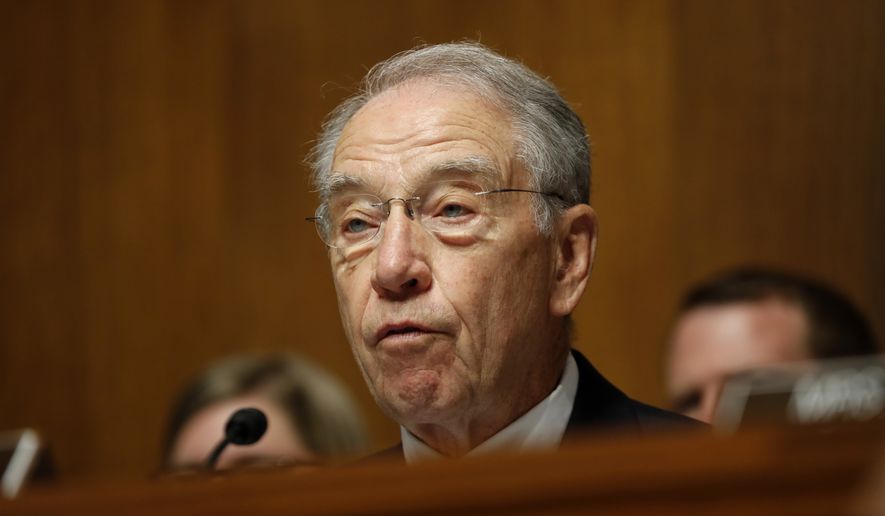The Senate Judiciary Committee cleared one of President Trump’s high-profile judicial picks Thursday on a party-line vote, but not before Republicans warned Democrats they were treading close to imposing an unconstitutional religious test by opposing the nominee.
Democrats had peppered University of Notre Dame law professor Amy Barrett with questions about her Catholic faith and religious affiliations during her confirmation hearing last month, asking whether she was an “orthodox Catholic.”
“Their questions strongly implied she was too Catholic for their taste — whatever it means to be too Catholic. I mention this because I fear the committee is heading down a dangerous road if we continue to ask nominees question like this,” committee Chairman Charles E. Grassley said Thursday.
The Iowa Republican said legal scholars have said the questions appeared to be the sort of religious test the Constitution specifically prohibits for any officeholders.
Mr. Barrett did clear the committee on an 11-9 vote and now heads to the full Senate.
Democrats said their opposition wasn’t aimed at Ms. Barrett’s religion.
“I myself am a product of Catholic education,” said Sen. Dianne Feinstein, the ranking Democrat on the committee. “I think people who know me know how I feel.”
She said she took issue with Ms. Barrett’s experience — not her religion — because she only worked on one trial prior to becoming a law professor.
Because Ms. Barrett lacked a significant legal record since she’s spent the majority of her career teaching, Democrats asked her about one of her academic writings on her faith and whether a Catholic judge should recuse himself or herself from a death-penalty case based on religious beliefs.
“So many of us on this side have this very uncomfortable feeling that dogma and law are two different things and I think whatever a religion is, it has its own dogma. The law is totally different and I think, in your case professor, when you read your speeches, the conclusion one draws is that the dogma lives loudly within you,” said Ms. Feinstein during the confirmation hearing.
“You are controversial,” Ms. Feinstein told Ms. Barrett. “You have a long history of believing that your religious beliefs should prevail.”
Sen. Richard Durbin, Illinois Democrat, said he asked Ms. Barrett about her faith during the hearing because she had spoken about both the burden and opportunity it presents in her profession.
“Do you consider yourself an orthodox Catholic,” Mr. Durbin asked Ms. Barrett.
“I am a Catholic, Senator Durbin,” she responded. “My personal church affiliation or my religious belief would not bear on the discharge of my duties as a judge.”
Sen. Al Franken, Minnesota Democrat, also tried to tie Ms. Barrett to a “hate group” during her confirmation hearing, saying the woman’s decision to speak at an event sponsored by Alliance Defending Freedom (ADF), a religious liberty law firm, makes her unfit to sit on a federal appeals court.
The hate group charge stems from a report by the controversial Southern Poverty Law Center, which identifies hundreds of organizations across the nation it says attack entire classes of people.
Mr. Grassley called the attacks against ADF unfounded on Thursday, saying the legal group won seven cases before the Supreme Court in the past seven years, so it’s not outside of the mainstream.
“Any difference in viewpoint folks may have with them boil down to policy differences, but dissent and differences of opinion don’t equal hate and it’s wrong to compare an organization like ADF to that of the KKK and the Nazi party,” said Mr. Grassley.
The questioning about Ms. Barrett’s faith sparked the conservative Judicial Crisis Network to launch an ad targeting the top Democrat on the committee, Sen. Dianne Feinstein of California, accusing her of “anti-Catholic bigotry.”
And on Thursday, The Catholic Association said Ms. Barrett’s qualifications are unquestionable.
“The only question is whether the senators that opposed her because she takes her faith seriously can overcome their anti-Catholic bias against her. We look now to the Senate to swiftly confirm her,” said Ashley McGuire, a senior fellow at The Catholic Association.
The committee also split along party lines in approving Michigan Supreme Court Justice Joan Larsen to serve on the 6th U.S. Circuit Court of Appeals.
Both of Michigan’s Democratic senators acquiesced in her nomination, but committee Democrats weren’t assuaged. Sen. Mazie Hirono, Hawaii Democrat, said she worried about Justice Larsen’s treatment of the LGBT community and women’s reproductive rights.
Ms. Hirono also took issue with Mr. Trump’s nominee to lead the Civil Rights Division of the Justice Department, Eric Dreiband, saying he didn’t have enough of a civil rights record.
Mr. Dreiband cleared committee also on a party-line vote.
Nan Aron, president of the progressive Alliance for Justice, applauded the Democratic senators for voting against the three nominees.
“Larsen takes an extraordinary view of executive power that would free President Trump to run roughshod over the Constitution in the name of national security,” said Ms. Aron. “Dreiband has spent much of his legal career opposing the rights of workers.”
• Alex Swoyer can be reached at aswoyer@washingtontimes.com.




Please read our comment policy before commenting.